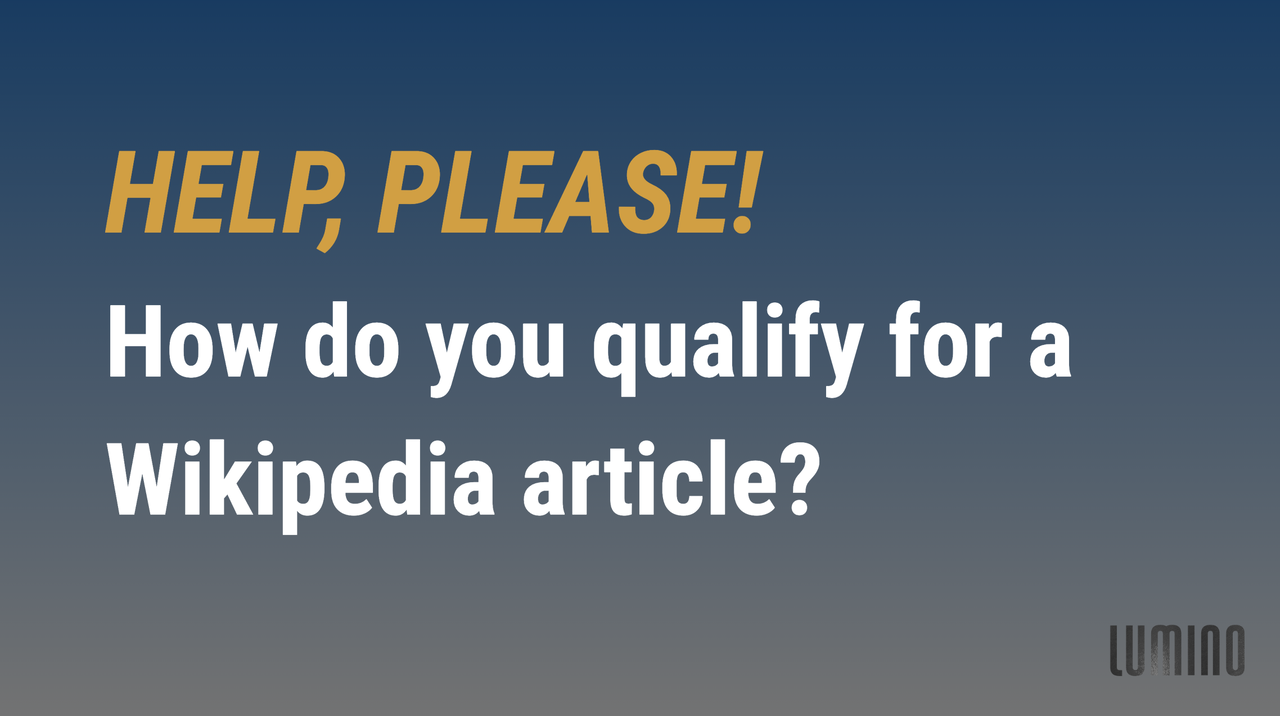
How do you qualify for a Wikipedia article?
Welcome to the second installment of Wikify, Lumino's newsletter about Wikipedia and all things digital. Last we covered the number one question we get from brand managers and marketers: "How can I create a Wikipedia page for my company?"
This week we're going to cover our second most frequently asked question, along with some recent news developments concerning EU and UK Wikipedia regulation and a fun generative AI cloning exercise you can try at home. Let's get started!
How does a topic (or brand or CEO) qualify for a Wikipedia article?
The simple answer is that Wikipedia editors use a test called “notability” to determine whether a topic can have its own article.
For those of us who live in the real world outside of Wikipedia, notability is typically defined in terms of fame, popularity, wealth, and status.
On Wikipedia, though, notability is primarily a reflection of media coverage.
Specifically, Wikipedia editors will be looking to see if a topic has received “significant coverage in reliable sources that are independent of the subject.”
So what does that mean in practice? Let's break it down:
- By "significant coverage," editors mean that there should be numerous articles about the topic that have been published over a range of time (not just following a one-off incident).
- "Reliable sources" means national media outlets with a reputation for fact-checking and accurate reporting, so newspapers like the Wall Street Journal or Los Angles Times and online sites like Politico, WIRED, Bloomberg, Insider, Axios, etc. (Regional and even local news sources can be fine as citations for specific factual claims, but they don't generally count towards establishing a topic's notability.)
- "Independent of the subject" means that the articles are written by staff reporters and are not contributor pieces, op-eds, interviews, press releases, or company website pages.
If you're unsure if your topic would pass Wikipedia's notability test, try this little exercise:
Create an outline of the article you'd ideally want to see on Wikipedia. Then, for every detail, add a link to press coverage that meets the criteria we've already covered. Any detail that doesn't have a supporting citation will need to be deleted from your outline.
If you can find supporting sources for each claim, then you might be ready to start drafting an article for Wikipedia. If not, you probably need to work on generating more media coverage.
Questions? Please let us know in the comments below.
European regulators target Wikipedia
Last week the European Commission released a list of the first seventeen companies to be designated as "Very Large Online Platforms" (VLOPs) under the bloc's new internet safety law, the Digital Services Act (DSA).
The list included a familiar list of global tech giants (Alibaba, Amazon, Facebook, TikTok, YouTube, etc.) along with... Wikipedia, a large site, certainly, but also a not-for-profit one.
An explainer at MIT Technology Review notes that companies on the EC's list will now be required to "assess risks on their platforms, like the likelihood of illegal content or election manipulation, and make plans for mitigating those risks with independent audits to verify safety."
This is an interesting framing because it would seem to hold the Wikimedia Foundation (the parent organization of and service provider for Wikipedia, Wikidata, Wikiquote, etc.) responsible for content decisions, whereas in practice it is the community of Wikipedia editors who are creating content and shaping editorial guidelines.
The Wikimedia Foundation has lobbied against the DSA, arguing that "[a]pplying a one-size-fits-all solution to the complex problem of illegal content online could stifle a diverse, thriving, and noncommercial ecosystem of online communities and platforms."
And as a result of these protestations from Wikimedia and others, the DSA was adjusted to distinguish (in some instances) between centralized and community-governed platforms. But the law still holds the service provider (in this case the Wikimedia Foundation) responsible for content.
If that weren't headache enough, the UK's Online Safety Bill (OSB)—expected to become law in the fall—presents similar regulatory and reporting requirements. As with the DSA, the OSB could force the Wikimedia Foundation to intervene in content decisions for articles that break UK law. In practice, this probably means taking contentious articles down.
The OSB also requires sites hosting sexual material (which Wikipedia does, albeit in the form of educational articles about sexual topics) to perform age checks—something the Wikimedia Foundation has already said it won't do.
There is fear that the site could be blocked in the UK as a result.
We will be following the implications of the DSA and OSB closely and will report back to you with any new developments!
Clone yourself (for fun and / or profit)
A few weeks ago the Garbage Day newsletter (which everyone should be reading) provided step-by-step instructions for creating an animated AI video by using a combination of voice cloning, art generation, and avatar animation. We tinkered around with the instructions to create our own AI clone and the results were... really creepy, tbh.
If you want to play around at home, just try the following:
- Create an account at ElevenLabs and the "voice cloning" feature to make an AI clone of your own speaking voice. You'll need to feed it at least 90 seconds of clean audio of you speaking for this to work well.
- Provide a script for the ElevenLabs voice model to read, then download that audio.
- Create an account at D-ID and upload your headshot into their animated avatar tool. Then upload the audio you created at ElevenLabs and voilà!
Don't say we didn't warn you! The future is here and it's incredibly unsettling.
Thus concludes our second installment of Wikify. Please let us know if there are any topics, Wiki-related or otherwise, you'd love for us to cover in the future.